Hello and thank you for stopping by… My name is Heather Martin. I am a designer, a creative entrepreneur and I work in arts education. I am interested in how design can catalyze social innovation. Reflective comments based upon my own learning, creative practice and teaching will be posted here, as well as any links, notes and comments related to my own professional development.
Don't wanna be here? Send us removal request.
Text
FASHION FIELD TRIP
CLOTHING OURSELVES IS A CULTURAL ACT

A sensory voyage exploring how garments of native fibres connect us to land and community
A rejuvenating day spent on the land. Sharing ideas with likeminded designers and educators, working together to bring regenerative design into the curriculum across the SW of England.
Many thank yous to @southwestenglandfibreshed and @fernhillfibre
#fibreshed#fibresheduk#southwestfibreshed#regenerativedesign#regenerativefarming#wool#farmingfashion
0 notes
Text

Making Futures is a research platform at Arts University Plymouth that explores contemporary craft and maker movements as 'change agents' in 21st century society. For the 2024 biennial conference, Beyond Objects, Arts University Plymouth invited academics, makers and creative pioneers to move past mere object-making and to engage in a holistic exploration of how materiality influences and enriches the human experience. It was a unique opportunity to meet with thought leaders, to exchange ideas, and to discover new perspectives that transcend traditional making practices.
It was a pleasure to peer review the submissions for the panel, to convene the presentations and to chair the discussions for Track 02: Re-Thinking Wearables bringing together Professor Becky Early, Mario Serrano Puche and Lingxiao Luo to explore the intersection of the body, environment and technology.
0 notes
Text

As part of the Making Futures conference the Arts University Plymouth Fashion studio hosted a practice-based research workshop and an exhibition. The workshop explored zero waste and modular pattern cutting methods based upon the UN-MAKE + RE-CLOTHE research and the exhibition featured the fashion-based Workroom residents; Anna Masclans - Studio PL1 Mia Cooper - Mia Grace Cooper and Megan Trapnell - Dart and Grey and garments prototypes from the UN-MAKE + RE-CLOTHE academic design research.
Feedback and conversations had in the workshop and during the workshop and exhibition will feed back in the UN-MAKE + RE-CLOTHE research and will also be incorporated into the Arts University Plymouth, Fashion Design teaching practice.

#circular economy design#making futures#critical making#design research#arts university plymouth#UN-MAKE & RE-CLOTHE
0 notes
Text
EXPLORING FASHION AT THE EDGE OF RURAL COMMUNITIES
#arts university plymouth#the new rural#rural creative communities#fashion design studies#local design#design research#critical making#distributed design#distributed geographies#inclusive design#local manufacturing#local economy#regenerative design#Celia Pym#tao design#raine studio#fierce flora#cornwall
1 note
·
View note
Text
THE NEW RURAL
BUILDING FASHION COMMUNITIES AT THE EDGE
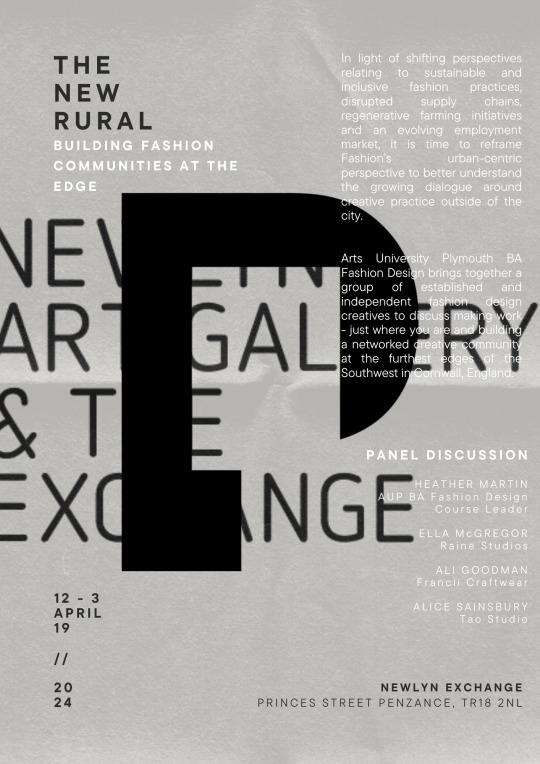
JOIN US // DATE: FRIDAY 19TH APRIL 2024
LOCATION: NEWLYN EXCHANGE
Princes Street Penzance, TR18 2NL
TIME: 12:00 - 15:00
In light of shifting perspectives relating to sustainable and inclusive fashion practices, disrupted supply chains, regenerative farming initiatives and an evolving employment market, it is time to reframe Fashion’s urban-centric perspective to better understand the growing dialogue around creative practice outside of the city.
Arts University Plymouth BA Fashion Design brings together a group of established and independent fashion design creatives to discuss making work - just where you are and building a networked creative community at the furthest edges of the Southwest in Cornwall, England.
AGENDA
12:00 Arrive - Newlyn Exchange, Penzance // The Engine Room
12:15 Welcome & Introduction - Heather Martin, Arts University Plymouth BA Fashion Design Course Leader
12:30 Speaker - Ella McGregor - Raine Studio
13:00 Speaker - Teagan Pharoah Green - Fierce Flora Clothing
13:30 Break
13:45 Speaker - Alice Sainsbury - Tao Studio
14:15 Q & A - with speakers
14:30 Networking
15:00 Close
#the new rural#design research#critical making#distributed design#distributed geographies#inclusive design#local manufacturing#local economy#regenerative design
0 notes
Text
SOUTH WEST ENGLAND FIBRESHED

The SW Fibreshed is building a community of fibre and dye growers, processors, makers and manufacturers across the South West to start a conversation about how we can produce more home-grown textiles and garments in a more healthy, resilient and regenerative textile ecosystem.
To support the development of the Farming Fashion: Wool: a Regenerative Farming to Fashion Resources Toolkit, I have been collaborating as an academic adviser.



0 notes
Text
FAB CITY PLYMOUTH
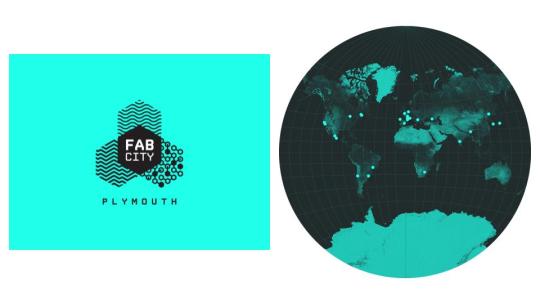
Did you know that Plymouth is a Fab City?
But what is a Fab City? The Fab City Global Initiative is a network of 52 cities committed to producing nearly everything they consume by 2054. Originally growing out of the Fab Lab rapid prototyping movement, Fab City covers everything from food to farming, from manufacturing to making, from creativity to culture. It asks, how can we make the best use of the resources on our doorstep and fully realise the social, economic and environmental benefits of a more circular economy.
@fabcityglobal
0 notes
Text
PLYMOUTH COLLEGE OF ART ACHIEVES UNIVERSITY STATUS, NEW TITLE IS ARTS UNIVERSITY PLYMOUTH

0 notes
Text
4R'S: CIRCULAR ECONOMY & ZERO WASTE EDUCATIONAL TOOLKITS
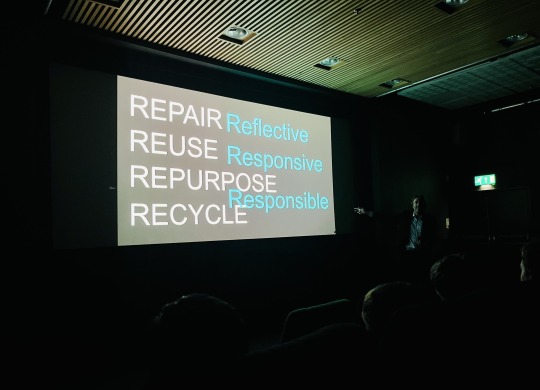
Arts University Plymouth leads the development of educational toolkits for teaching zero waste principles to primary, secondary and college level students in Finland, Turkey, England and Spain.
As part of the Erasmus+ funded project development, sharing rights of all images have been granted by the working partners at each educational institution.

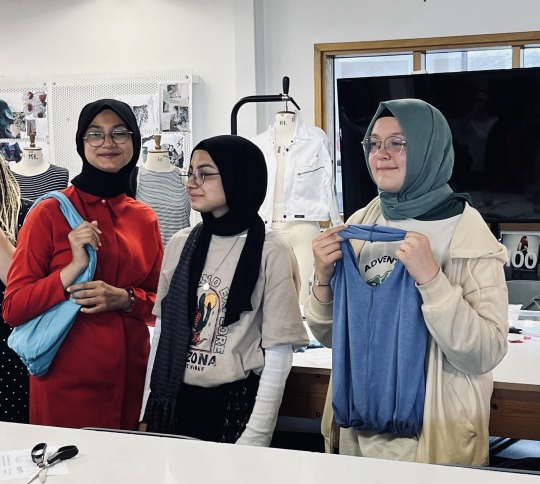

#circular economy#zero waste#design#textiles#closed loop#sustainable design#international exchange#arts education
0 notes
Text
ARGAL FARM RESIDENCY, CORNWALL

Borrowed studios continued. Over the time that I have been a creative maker, I've been so lucky to be able to borrow and set up studio all over the world. This here is a nice little three week design residency over my summer leave at the Argal Home Farm, just outside of Falmouth, Cornwall. Thank you so very much for the warm welcome Ali - Francli Craftwear and for sharing your beautiful studio with me!
0 notes
Text
MAKERS HQ & BA FASHION DESIGN STUDENTS PRODUCE PPE OUT OF SURPLUS HOSPITAL CURTAINS FOR LOCAL SURGERY
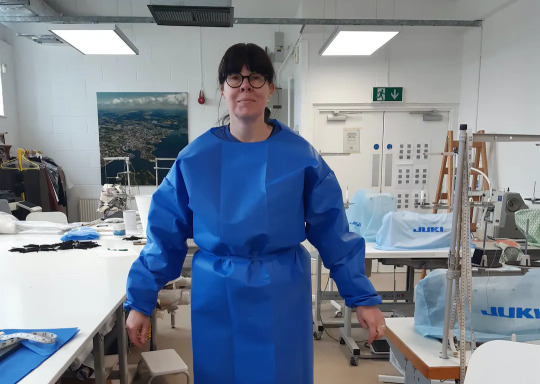
Unique challenges have arisen from the COVID-19 (coronavirus) global pandemic putting pressure on many of our essential services. Makers HQ, a community interest fashion sampling studio and training centre in collaboration with Plymouth College of Art, Millfields Trust and the local Stonehouse community, have responded by putting their sewing skills to use during the lockdown, producing protective gowns for a local medical practice.
In response to an urgent callout for personal protective equipment (PPE) from GP Dr Amanda Harry at West Hoe Surgery, Makers HQ jumped into action producing vital clothing construction kits. Local volunteers from Plymouth College of Art and the wider community, with technical knowledge of fashion design and production, are now using the kits to manufacture gowns and scrubs from medical curtains — fabric usually found dividing patient beds in hospitals.
Makers HQ provides high-quality sampling services to the fashion and textile industry as well as offering a diverse range of qualifications and short courses from pattern making to stitching. The studio has now made its machinery and skills available to facilitate the production of vital PPE.
Makers HQ have now received a delivery of fifty curtains from the surgery along with a sample and a pattern to get started. After a tweak to the pattern by pattern cutters, machinists at the studio have cut the curtains to size, ready for distribution. Elastic for the cuffs, threads, instruction manuals and domestic sewing machines have then been organised into kits for volunteers to create in the safety of their own home.
Heather Martin, Senior Lecturer and Course Leader for BA (Hons) Fashion Design, has coordinated a number of volunteers including Plymouth College of Art academics, technicians and supporting staff as well as students across multiple creative disciplines. So far over 100 kits have been produced, and within one week over 30 undergraduate students from the college have offered to give up their time to support the needs of local industry.
Heather said: “It makes me very proud to teach, as so many of our fashion students have joined forces with Makers HQ to produce PPE for the NHS. This interest is testament to the kind of socially-minded students that we have in our course and at Plymouth College of Art.”
“This is a function over form project that encourages our students to understand just how transferable and valuable their skill set is. It reaches beyond the next trend to solve real-world problems that can benefit our local communities.”
Year three BA (Hons) Fashion student and volunteer River Smith said: “My mum is a nurse within the NHS, so I’ve grown up understanding how important the NHS and its staff is. I’ve wanted to help and contribute towards the PPE shortage, but staying at home makes it feel like we’re doing nothing. We’re doing our part, but when this opportunity came up, I jumped at the chance to get involved and do some good.”
Makers HQ Studio Manager Sophie Glover said: “This is a difficult time for our business as we’ve had to pause most of our operations and furlough some staff. At the same time, we want to do everything we can to help the NHS, and it’s great that we’ve been able to draw on our partnership with Plymouth College of Art to support this project.”
“Our hope is that we can coordinate with all the relevant bodies so that we can help the NHS on a bigger scale while also being able to sustain our business and put more of our employees back to work.”
Makers HQ is a community interest company operating as a fashion sampling studio and training centre, providing high-quality services to the fashion and textile industry. Supporting designers to get their collections ready to show and sell, Makers HQ provide essential sampling facilities to established brands. The studio also offers a diverse range of qualifications and short courses from pattern making to stitching skills.
Credit: Plymouth College of Art Editor & Writing Team
Originally posted April 9th 2020.
0 notes
Text
MAKERS HQ
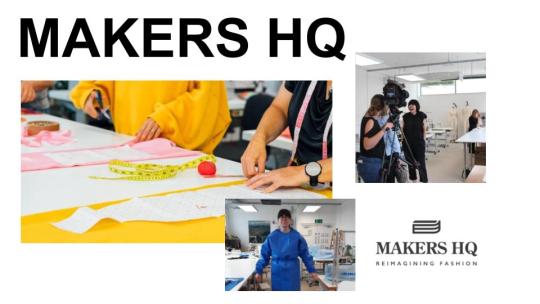
Makers HQ is a Community Interest Company and project that is based in the HQ Building on Union Street in Plymouth, Devon. With a mission to reignite fashion and textiles manufacturing in the city, it aims to bring together academic institutions, businesses, designers, makers and members of the local community to create a new wave of independent business and ethical clothing manufacturing based in the SW.
I have worked behind the scenes in the development of Makers HQ as a board member and as a volunteer director since its inception. In fact, it is one of the main reasons why I came down to Plymouth to take up the role with Plymouth College of Art in the first place!
#local economy#community interest company#local manufacturing#plymouth college of art#makers hq#garment manufacturing
0 notes
Text
MAKING FUTURES

Making Futures is an academic conference hosted by Plymouth College of Art. I hosted an idea generating workshop as part of the Lifecycles of Material Worlds - Sustainability in Practice research strand.
The 1 + 1 Propositional Pattern Cutting System is the first design research output in the UN-MAKE & RE-CLOTHE project. It is a circular or modular design and make system that was initially conceived through an investigation into how the process of critical making could begin to address gaps in knowledge and in practice that extend beyond the limited body of research in ecologically, sustainable fashion design innovation.
This submission to the Making Futures conference proposes to build upon the 1 + 1 system by utilizing it as a tool or a method to investigate further into the transformative opportunities that can be created through collaborative design and participatory action. I proposed and developed an idea generation workshop to gain deeper knowledge into the feasibility of introducing the 1 + 1 Propositional Pattern Cutting System to an open source platform and a re-design / re-make distribution service.
0 notes
Text
OLIVE... THE NEW TO ME SINGER SEWING MACHINE

So this is Olive. Olive was the sole owner of the Singer sewing machine that I just purchased. A 1947 Singer that sews like a dream. The chap in the photo is Olive’s soon to be husband who, at the time of this photo, had just returned to Britain from the war where he had been interned in Japan. The sewing machine was a wedding present. The photo of these two came with the sewing machine and I am so very inspired to have heard about their story and their lives.
It is a rarity these days to hear of someone buying a sewing machine let alone a purchase that dates as far back as this. These machines were built to last and this one is a true testament of its time. This will be one of only a few domestic sewing machines that I have ever purchased and I have done so knowing that these particular machines were made to be workhorses. While taking the first few stitches on this machine I knew that it was a keeper and I very much look forward to utilizing it to its fullest to develop a few new ideas.
Thank you Olive. May you rest knowing that your name carries on.
0 notes
Text
VIVA - GLASGOW SCHOOL OF ART // MASTERS OF RESEARCH - DESIGN INNOVATION
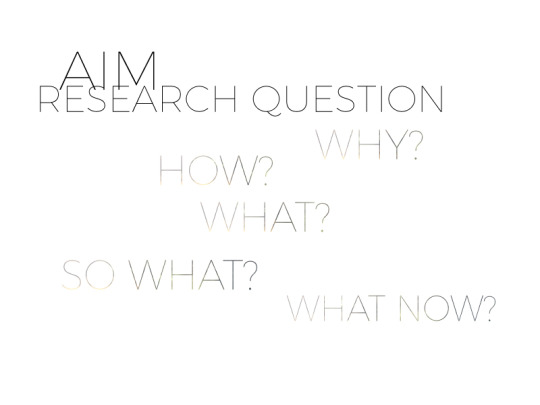
A viva voce is a long-established part of the examination process for a research degree. The main focus of the assessment is on the written thesis/dissertation (and other outputs, for a Practice as Research students). However, the viva gives you the opportunity to defend your thesis and is used to inform the examiners’ final assessment decision.
Examiners // Dr Janet McDonnell: Professor of Design Studies at Central Saint Martins College of Art & Design, University of the Arts, London, UK & Dr Brian Dixon: Head of Belfast School of Art
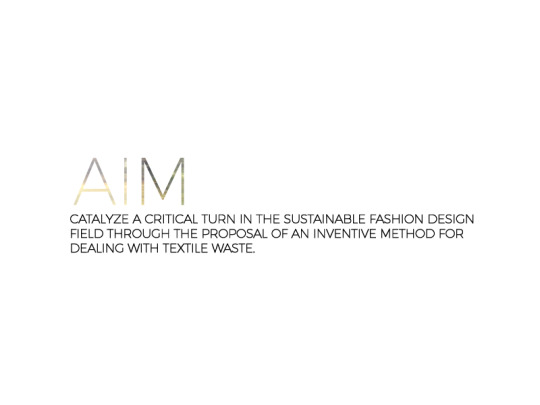
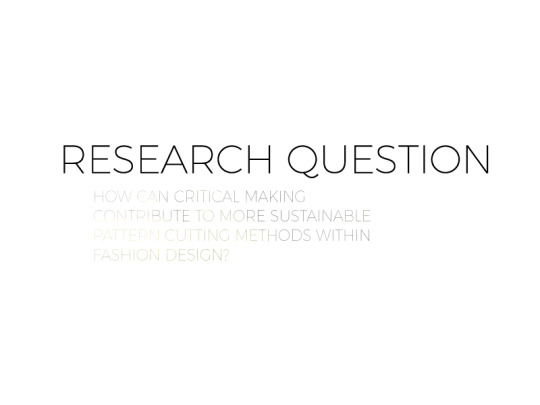
AIM // The intention of this practice based research is to catalyze a critical turn in the sustainable fashion design field through the proposal of an inventive method for dealing with textile waste.
This proposal is realized through critical making and this study puts forward critical making as a method that can contribute to the mobilization of systems change within the fashion industry.
WHY? // Fashion is under scrutiny for its wastefulness – the current fashion system perpetuates continuous consumption driven by speed, change, planned obsolescence, artificial newness and aesthetic trends
The fashion industry is very slow to adopt more sustainable practices. barriers towards implementation for change exist with limited practical, viable and production-minded scalable examples of ways to shift forward within academic research as well as industry.
As design and consumption are inter-related – design can proactively influence and begin to realize this change.
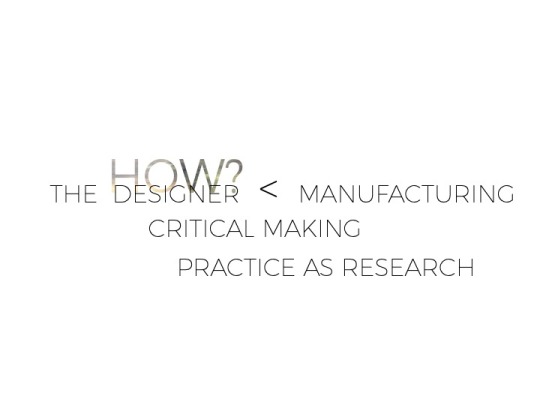


HOW? // Holistically connecting the designer back towards the processes of manufacturing can open up a much-needed critical dialogue between designing and making where generative and constructive design-led insights can begin to unpack the complexities of fashion’s sustainability issues.
MAKING SPACE TAKING TIME // THE STUDIO
The process in which the study is undertaken is through the primacy of the studio process claiming that critical making is a constructive and generative process where visual and embodied links can be made that might otherwise be overlooked or unrealized through language-based approaches.
An investigation of PRACTICE AS RESEARCH is highlighted through an exploratory case study; studio practice, drawings, assemblage and textile studies are used as tools that aid to synthesize, analyze and further develop new ways of thinking about the design making process.
CRITICAL MAKING acts as a means to connect our technologies with our lived experiences offering up social and conceptual critique of the assumptive making processes that we employ.
Matt Malpass (2017) Critical Design in Context

VISUAL ARTS KNOWING
Thinking in a Medium gives structure and physicality to the work in the studio,
Thinking in a Language frames the practice through reflective dialogue and
Thinking in a Context through embodied ways of making situates the practice to become research.
Graeme Sullivan (2009) Art Practice as Research
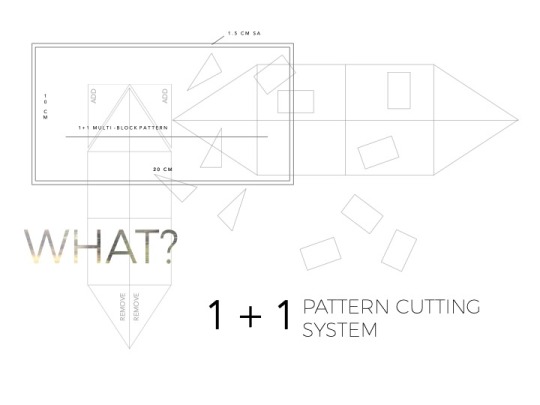
WHAT? // 1 + 1 = A Propositional Pattern Cutting System
1 + 1 is a zero-waste, negative-waste and additive pattern cutting and clothing design system that scales a single block shape into a variety of silhouettes by repeating and assembling that block shape to create the complete garment. The system can be used with regular lengths of new cloth, end rolls of fabric and textile waste materials.
SO WHAT??
Leading the design enquiry with a holistic view puts the waste up front and centre.
This way of designing encourages the designer to gain a deeper understanding of the complexity of the whole process pulling production back into the initial stages of design development.
The designer can be instrumental in determining how waste materials are used in the creation of the design through pattern cutting.
By creating a pattern that works within the constraints of waste material, the designer not only restricts the amount of resources used but also shapes the formation of the silhouette and the resulting outcome.
This process of making and un-making establishes a circular ethos that embodies an approach that places an emphasis on the criticality of message within its aesthetics and incorporates re-formation through a multiplicity of design in its function.
WHAT NOW?
Opening up the 1 + 1 Pattern Cutting System beyond the individual studio practice and extending its processes into a master class framework, a workshop format or through open source access would further promote a deeper engagement to reveal significant insights and critical feedback.
Such collective working sessions would setup a platform to increase the body of knowledge around the 1 + 1 system’s viability, transferability and scalability extending the research within the zero and negative-waste design and sustainable design fields.
The 1 + 1 not only offers an alternative technology for sustainable design but it also explores the process that it took to get there. it is through the critical making process where a multiplicity of re-directive and alternative approaches can be put forward.

I // MRES > 1 + 1 AS A DESIGN RESEARCH OUTPUT
IT // SHARE THE DESIGN & PROTOTYPING PROCESS
WE // BUILD A COLLECTIVE SYSTEM
ITS // CONNECT THE SYSTEM TO A NETWORK
#VIVA#design research#modular design#zero waste pattern cutting#zero waste design#practice based design research#critical making#sustainable fashion design methods
0 notes
Text
THE WORK STUDIO

The work studio. Plymouth College of Art, Devon - SW of England. From the top to the bottom in one swift decision.
0 notes
Text
1 + 1 MODULAR PATTERN CUTTING SYSTEM
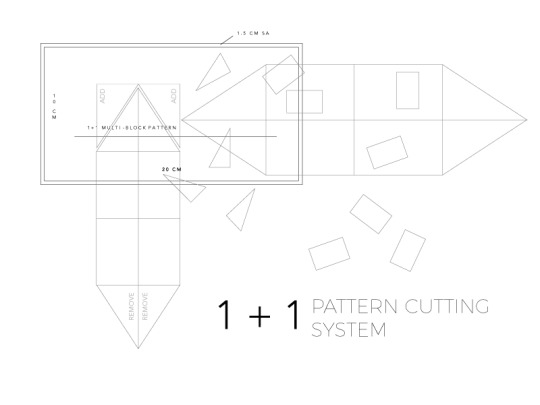
Designed as part of my MRes thesis; the 1 + 1 PROPOSITIONAL PATTERN CUTTING SYSTEM is a zero-waste, negative-waste and additive pattern cutting and clothing design system that scales a single block shape into a variety of silhouettes by repeating and assembling that block shape to create the complete garment. The system can be used with regular lengths of new cloth, end rolls of fabric and textile waste materials
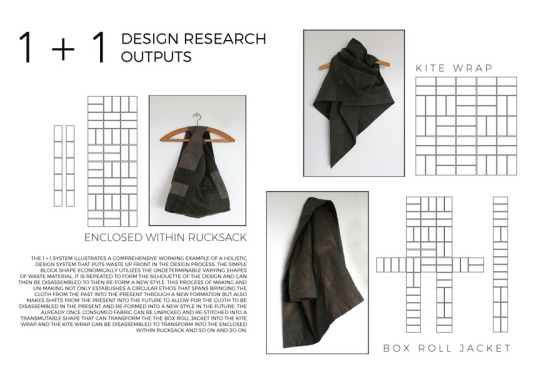
1 + 1 DESIGN RESEARCH OUTPUTS
The design outputs form the 1 + 1 system illustrate a comprehensive working example of a holistic design system that puts waste up front in the design process.
The simple block shape economically utilizes the undeterminable varying shapes of waste material, it is repeated to form the silhouette of the design and can then be disassembled to then re-form a new style.
The already once consumed fabric can be unpicked and re-stitched into a transmutable shape that can transform the Box Roll Jacket into the kite wrap and the kite wrap can be disassembled to transform into the enclosed within rucksack and so on and so on.
NEXT STAGES for The UN – MAKE & RE – CLOTHE project is to use this work as a propositional tool to gain a deeper knowledge into the feasibility of introducing the 1 + 1 Propositional Pattern Cutting System to the market as an open source platform and a re-design / re-make distribution service.
#zero waste design#zero waste pattern cutting#modular pattern cutting#closed loop design#clothing making#critical making#critical design#practice based design research#design research#mres#Glasgow School of Art#design innovation#circularfashion#circulareconomy
1 note
·
View note